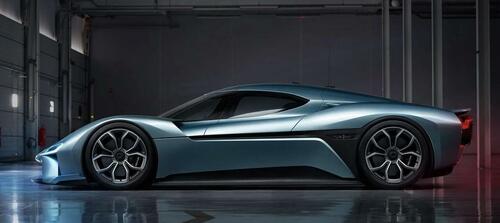Challenging electric vehicle orthodoxy, US-listed Chinese EV start-up Nio is leading the charge on a different approach to re-energizing vehicles — having drivers swap out spent batteries rather than recharging them. With swapping stations already up and running in 285 Chinese cities, Nio is betting that consumers will be won over by time savings and cost advantages of battery-swapping.
The technology is well beyond the pilot phase: In July, Nio celebrated is 80 millionth battery swap in China. The swap is easier than filling up a petrol car or re-charging a typical EV. After pulling up to a swapping station, the driver issues a command via voice or the car’s input screen. The car then drives itself into the station, stopping above a retractable metal floor. Robotic arms remove the spent battery and insert a new one. After a quick software and hardware check, the driver is back on the streets — with the whole swapping process taking only about 3 minutes.
Faster re-powering is one advantage. Battery-swapping can also slash the price of a car by thousands of dollars, because the vehicle owner doesn’t own the battery, notes Financial Times. That also eliminates the potential for a huge expense when a battery is damaged or dies. It also makes sense for people living in densely populated cities, where dedicated charge points may not be plentiful in apartment buildings.
China may hit a major EV milestone this year, with EV sales topping internal combustion for the first time. Chinese battery maker CATL — the largest producer in the world — plans to build 1,000 swap stations for passenger vehicles in China in 2025, targeting 10,000 stations by 2028 with a capacity for 1 million battery swaps a day. China is offering subsidies that cover up to 40% of the cost of building swapping stations.

Nio has established a modest battery-swapping beachhead in Europe, with 60 stations concentrated in Norway and Germany. Nio’s map also shows stations in Sweden, Denmark, Belgium and the Netherlands. Earlier this week, NIO celebrated its 200,000th European battery swap. The company said 74% of European users “now choose the speed and ease of changing batteries.” However, the pace at which the company is installing new swap-stations in Europe has stalled, with just 10 stations opening in the past year. In April, EV reported that Nio had significantly cut its investment in European expansion. Managing battery compatibility — to cover the various batteries used by different EV brands — appears to be one of the challenges in rolling out new European stations.
Some in the industry think battery-swapping isn’t the best avenue, with a high cost of infrastructure among the concerns. He Xiaopeng, chief executive of EV maker Xpeng, told the Times that his firm considered that alternative process “for five or six years” before discarding it altogether around 2023. “Advancing battery technology is [more important] than developing battery-swapping capabilities. That’s the path we’ve chosen,” said He. Across the EV industry, the emphasis has been on flash recharging. Last month, China’s National Development and Reform Commission announced it will build 100,000 fast-charging stations over the next two years.
Loading recommendations…

















